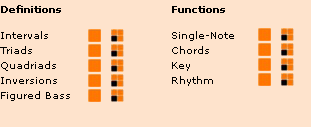




The Triad
After a note pair, the triad is the next most basic harmonic structure, consisting of three different notes sounding together. Strictly speaking, a triad is any three-tone chord: however, we shall start by considering only tertian triads, built by stacking major or minor 3rd intervals. If we consider the major 3rd, minor 3rd and perfect 5th intervals as acceptable consonances, then all three intervals in a triad (arising from all note pairings) must be consonant.
Stacking all combinations of major and minor 3rd intervals, we obtain 4 triads. Taking C as bass note, we have:
| Major Triad | Has a major 3rd interval between C & E, and a minor 3rd interval between E & G. |
| Major Triad | Has a minor 3rd interval between C & Eb, and a major 3rd interval between Eb & G. |
| Diminished Triad |
Has a minor 3rd interval between C & Eb, and a minor 3rd interval between Eb & Gb. |
| Augmented Triad |
Has a major 3rd interval between C & E, and a major 3rd interval between E & G#. |
All other combinations of three notes containing intervals like the minor/major 2nd, the augmented 4th, or the minor/major 7th will generate dissonant chords. See Intervals (basic).
The Elements of Harmony | Baroque Harmony | 4-Part Jazz Harmony | Harmonic Sequences Archive | Percussion | Pythagoras | 4-Part Score Editor | Discussion Forum